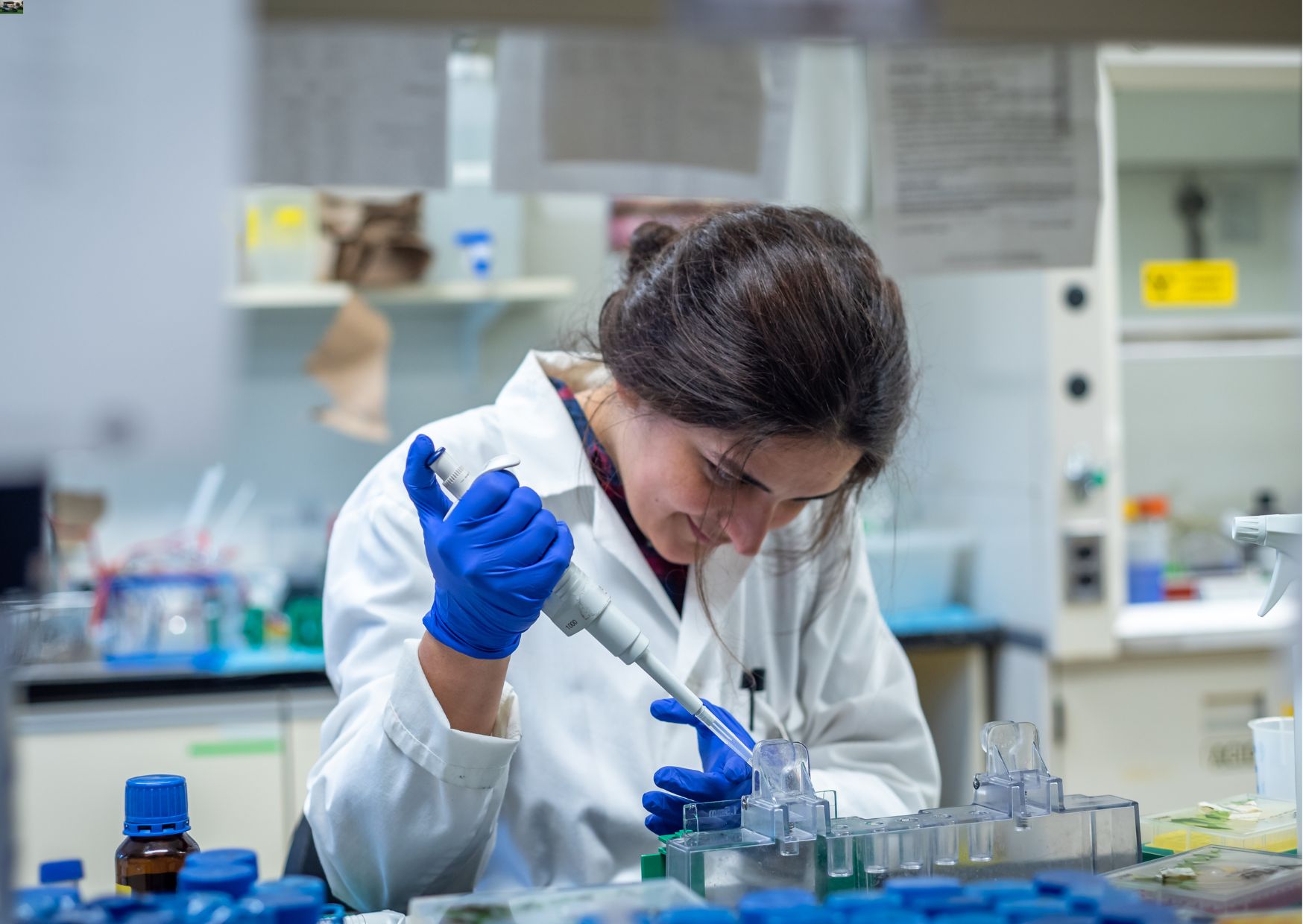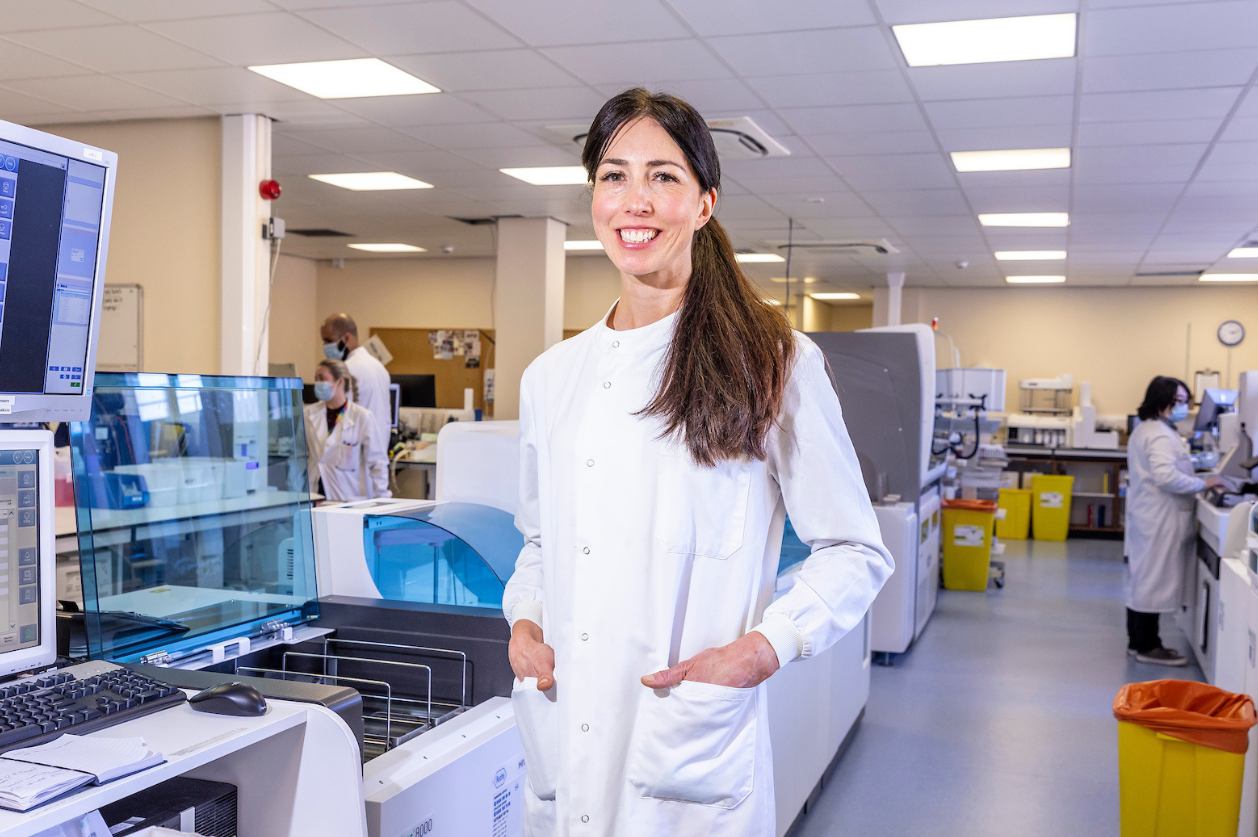To become a biomedical scientist in this rapidly changing field, one must study and understand the biological processes that cause and maintain health and disease. Biomedical science focuses on discovering, developing, and optimizing diagnostic tools and treatments.
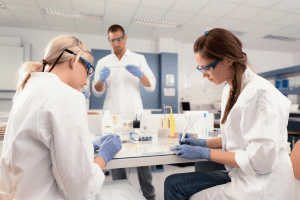
A biomedical scientists have an important role in healthcare and research and contribute to new understanding and ways of advancing medical knowledge and patient care.
What are the Main Types of Biomedical Scientists?
Biomedical scientists encompass clinical biochemists, hematologists, microbiologists, and immunologists, each specializing in distinct areas of biological research and clinical practice to advance medical understanding and patient care.
Clinical Biochemists
Clinical Biochemists analyse bodily fluids to diagnose diseases and monitor treatments by measuring biochemical compounds, vital for patient care in healthcare settings.
Role and Key Responsibilities:
Clinical biochemists work in hospitals and clinics, analysing blood and other bodily fluids to diagnose diseases and monitor treatments. They measure levels of biochemical compounds using techniques such as biochemical assays, for example, to determine if a patient has excessive levels of an enzyme, hormone, or electrolyte.
Hematologists
Hematologists diagnose and treat blood disorders, including anaemia, leukaemia, and clotting problems, through specialised testing and therapies.
Role and Key Responsibilities:
Hematologists specialise in the study of blood and blood disorders, including anaemia, leukemia, clotting problems, and various blood tests that aid clinicians in diagnosis and treatment development.
Microbiologists
Microbiologists study bacteria, viruses, fungi, and parasites to understand their impact on health, disease, and the environment, applying findings to medicine, agriculture, and environmental science.
Role and Key Responsibilities:
Microbiologists study infectious diseases caused by bacteria, viruses, fungi, and parasites. They conduct laboratory tests to identify potential pathogens and evaluate them using methods such as differential staining and antibiotic sensitivity tests.
Immunologists
Immunologists study the immune system, and its disorders like allergies and autoimmune diseases, and develop therapies to treat these conditions.
Role and Key Responsibilities:
Immunologists focus on studying the immune system, immune disorders (including allergies and autoimmune diseases), and the development and implementation of tests to assess immune function. They also contribute to the creation of innovative therapies and treatments.
What does a Biomedical Scientist do?
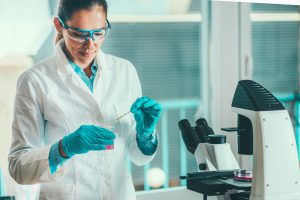
Biomedical scientists conduct tests and experiments in labs to diagnose diseases, analyse biological samples, develop diagnostic tests, research disease mechanisms, and collaborate with healthcare professionals while ensuring lab equipment is maintained and safety protocols are followed.
Conducting Laboratory Tests and Experiments
Biomedical scientists can be found in laboratories across the world conducting a range of tests and experiments to diagnose diseases, monitor treatment, or conduct research.
Analysing Biological Samples
They interpret the results of tests on biological samples, including blood, tissue, and urine, used to diagnose abnormalities and diseases.
Developing and Validating Diagnostic Tests
Biomedical scientists devise and validate novel diagnostic tests or procedures to enhance the accuracy and efficiency of disease detection.
Researching Disease Mechanisms and Treatments
Biomedical scientists investigate disease mechanisms to develop innovative treatments and therapies. They study biological processes at molecular levels, aiming to identify targets for new drugs and diagnostics, ultimately improving patient care and outcomes.
Collaborating with Healthcare Professionals
Biomedical scientists work closely with doctors, nurses, and other healthcare professionals to provide accurate diagnoses and optimal patient care.
Maintaining Laboratory Equipment and Safety Protocols
Biomedical scientists oversee the calibration of lab instruments and enforce safety protocols to protect personnel from hazards in the workplace.
Average Salary Range of a Biomedical Scientist
Biomedical scientists’ salaries vary widely based on experience, location, and specialization, reflecting significant earning potential across different career stages and settings.
Salary Ranges Based on Experience and Location
Salaries for biomedical scientists vary significantly based on experience, location, and laboratory type. In the UK, entry-level biomedical scientists typically earn between £24,000 and £30,000 annually, while early- to mid-career researchers earn around £30,000 to £40,000 per year. Senior biomedical scientists can earn £40,000 to £60,000 or more annually. In the US, entry-level salaries range from $50,000 to $70,000 per year, with early- to mid-career researchers earning approximately $70,000 to $90,000 annually. Senior biomedical scientists in the US may earn $90,000 to $120,000 or more per year.
Comparison of Salaries in Different Regions and Types of Laboratories
Salaries are typically higher in large urban areas and regions with high demand for biomedical scientists due to cost-of-living differences and medical supply shortages. Researchers and private laboratories often offer higher salaries compared to public healthcare.
Factors That Influencing Biomedical Scientist Salaries
Several factors influence biomedical scientist salaries:
- Experience: Higher pay is usually associated with more experienced scientists who demonstrate advanced skills and capabilities.
- Education and certifications: Advanced degrees and certifications contribute to higher earning potential.
- Location: Urban settings generally offer higher salaries compared to rural areas, reflecting higher living costs.
- Specialisation: Specialised roles like clinical biochemists or immunologists often command higher salaries.
Essential Skills of a Biomedical Scientist
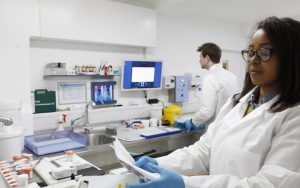
To become a successful Biomedical Scientist, you need to bring together technical and soft skills.
Technical Skills
- Proficiency in Laboratory Techniques and Equipment: Competent in basic to advanced laboratory techniques and proficiently uses laboratory equipment.
- Knowledge of Molecular Biology and Biochemistry: Essential for designing and interpreting research programmes, requiring a thorough understanding of molecular biology and biochemistry.
Soft Skills
- Analytical Thinking: Crucial for interpreting complex data and facilitating accurate diagnoses.
- Attention to Detail: Essential in laboratory work to conduct precise tests and ensure reliable results.
- Communication: Strong communication skills are essential for collaborating with healthcare professionals and presenting research findings.
- Problem-Solving: Effective problem-solving abilities enable biomedical scientists to tackle challenges and devise innovative solutions.
Career Development Tips for Biomedical Scientists
- Keeping up-to-date With the Field of Biomedical Research and Technology: Given the constant evolution of discoveries and technologies in a changing environment, continuous learning and knowledge updating are necessary.
- Networking Opportunities Through Professional Organisations and Conferences: Joining professional organisations and attending conferences provide networking opportunities and valuable resources.
- Getting Practical Experience with Internships and Research Projects: Practical experience, especially through internships and research projects, is crucial for skill development.
- Perfecting Your Laboratory Skills and Knowledge: Regular practice of laboratory skills and knowledge is essential for a successful career in biomedical sciences.
Qualification and Requirements for Biomedical Scientist
To become a Biomedical Scientist specific educational and professional requirements must be met.
Educational Requirements
- Bachelor’s Degree in Biomedical Science or a Related Field: A bachelor’s degree in biomedical science or a related field is typically the minimum requirement for employment.
- Relevant Coursework and Laboratory Experience: Preparation for graduate study in the field should ideally include coursework in relevant subjects such as biology, chemistry, biochemistry, and laboratory experience.
Certification Requirements
- Certification Through Professional Organisations: Holding a certification from an organisation such as the Institute of Biomedical Science (IBMS) can give your clients confidence that you are a skilled professional who adheres to professional standards.
- Ongoing Continuing Professional Development: Biomedical scientists are required to engage in CPD activities to stay updated with advancements in the field and maintain their certification and professional competence.
Experience Requirements
- Internships and Research Experience: Gain experience through internships or working as a research assistant.
- Practical Laboratory Skills: Demonstrating proficiency in practical laboratory skills is essential for successful career advancement in biomedical science.
How to Become a Biomedical Scientist?
Become a biomedical scientist by earning a bachelor’s degree in biomedical science, gaining practical experience through internships, and obtaining certification. Stay updated with advanced training and networking opportunities to excel in this dynamic field.
Completing Relevant Education
- Getting a Bachelor’s Degree in Biomedical Science or a Related Field: The first step is to obtain a bachelor’s degree in biomedical science or a related field.
- Specialised Courses and Laboratory Training: Enrol in specialised courses and laboratory training to gain practical skills and knowledge.
Gaining Practical Experience
- Internships and Research Assistant Positions: Gain practical experience by interning with various organisations or working as a research assistant to build your skills and create your portfolio.
- Volunteer Opportunities: Seek out volunteer opportunities in relevant settings to gain additional practical experience and broaden your skill set.
Obtaining Certification
- Certification via professional associations such as the IBMS: Earn certification to demonstrate your competence and commitment to professional standards.
- Maintaining Licensure: Regularly renew and maintain your licensure or certification to ensure compliance with regulatory requirements and demonstrate your ongoing commitment to professional integrity and competence.
Continuing Professional Development
- Workshops, Seminars, Webinars: Participate in continuous professional development through various training opportunities.
- Advanced Training and Specialisations: Pursue advanced training and specialisations to further develop your expertise.
Networking
- Join Professional Bodies: Become a member of professional societies such as the Institute of Biomedical Science (IBMS) to network and stay updated with industry trends.
- Attend Scientific Conferences and Events: Participate in scientific conferences and events to connect with fellow scientists and stay informed about advancements in the field.
Get Qualified as a Biomedical Scientist
Biomedical Engineering Diploma, Biomedical Engineering Basics, Science of Drawing
Frequently Asked Questions (FAQ)
- Why should you be a Biomedical Scientist?
A career as a biomedical scientist is exciting, developmental, productive, and fulfilling. Biomedical scientists contribute to medical advancement, enhance patient care, and engage in pioneering medical research. It is a highly respected and rewarding career path, offering excellent job security, competitive salaries, and fulfilment through impactful contributions to the healthcare field.
- Is Biomedical Science a Good Career Choice for You?
If you are fascinated by science and enjoy hands-on lab work, and you have an interest in medical research, then a career in biomedical science could be ideal for you. You will thrive if you are detail-oriented, analytical, and adept at problem-solving, and if you excel in a research-oriented environment, dedicated to advancing healthcare.
- Salary Range of a Biomedical Scientist
It varies based on their experience, sector, and the type of laboratory. Typically, starting salaries for biomedical scientists could range from £24,000 to £30,000 a year in the UK and the US, increasing to £30,000 to £40,000 for mid-level biomedical scientists in the UK, and $70,000 to $90,000 in the US. Senior biomedical scientists or those in niche roles can earn £40,000 to £60,000 or more in the UK and $90,000 to £120,000 or more in the US.
- Which Qualifications Can Help with a Career in Biomedical Science?
The first step is to earn a bachelor’s degree in biomedical science or a related field. Specialised courses and lab training provide essential skills and knowledge. It is important to obtain certification from a professional organisation, such as the Institute of Biomedical Science (IBMS), to demonstrate your competence and commitment to professional standards. The second step is to gain practical experience by working as an intern or research assistant, which allows you to refine your skills and build your reputation.
- Do I Need to Be an Experienced Scientist to Get Started?
No, you do not have to be an experienced scientist when you begin your path in biomedical science. Often, we start as undergraduates with a BSc degree and gain practical experience through internships or by working as research assistants. Enthusiasm, a desire to learn, and a drive for science and research are all great starting points.
- Biomedical Scientist Career Outlook
Statistically speaking, these are indeed opportune times for biomedical scientists. The demand for medical research and diagnostics remains stable. As we enhance health and encounter new health challenges, the demand for biomedical scientists to investigate these issues grows. This, coupled with job security, competitive salaries, and career progression opportunities into specialised roles or top-level management, makes it an appealing career choice.
- Biomedical Scientist Hierarchy and Progressing Within the Role
A typical career path for a biomedical scientist starts at entry level, often as a laboratory technician or research assistant. After gaining 2-3 years of experience at the laboratory bench, skilled individuals progress to mid-level positions, eventually becoming senior biomedical scientists or laboratory managers. Advancement to higher levels includes roles such as principal investigator, research director, and academic professor, which necessitate ongoing education, on-the-job training, and advanced certifications.
- Biomedical Scientist Exit Options and Opportunities
As biomedical scientists advance in their careers, they encounter a wide range of opportunities. They can transition into various sector-based roles in industries such as pharmaceuticals, biotechnology, and health services management, applying the skills acquired as biomedical scientists. Experienced professionals may also pivot to careers as clinical research associates, medical science liaisons, or regulatory affairs specialists. Pursuing an advanced degree opens doors to teaching or conducting research in biomedical science, offering further pathways to explore and new opportunities to pursue.

